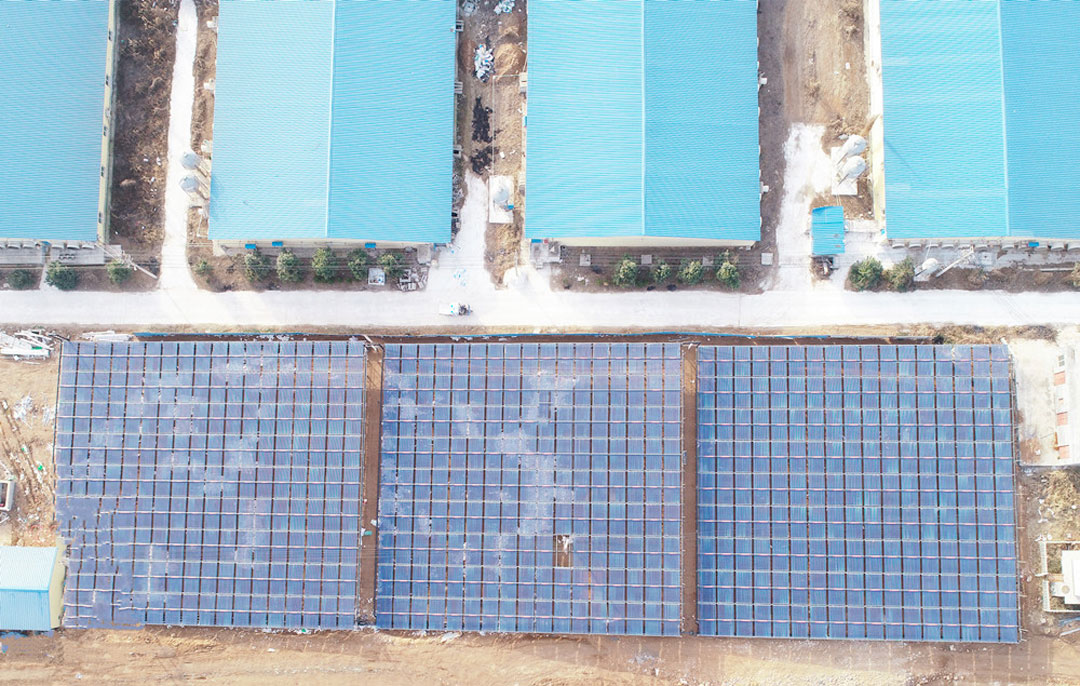Shandong Dingtai Animal Husbandry Plant Solar Heating Project Case Introduction
Amid China's national push for the "dual carbon" goals and green development initiatives, traditional livestock farming faces urgent demands for energy conservation and emission reduction. Shandong Dingtai Animal Husbandry in Changqing District, Jinan City, has responded to policy calls by pioneering solar heating technology. Their model project for pig farm heating not only effectively resolves heating challenges but also delivers remarkable economic benefits while reducing environmental impact, providing valuable insights for the industry's green transformation.
Project Background and Overview
Located in central-western Shandong Province, Qingcheng District of Jinan City features a temperate monsoon climate with cold, dry winters where temperatures can plummet to around-10℃°C. For pig farming, maintaining optimal temperature conditions is crucial for ensuring healthy growth and boosting productivity, particularly for piglets in nursery areas and adult pigs in breeding zones that are highly sensitive to temperature fluctuations. Traditional pig farming facilities predominantly rely on gas boilers for heating, which not only consume excessive energy and incur high operational costs but also generate significant emissions—contrary to modern eco-friendly development principles.
To address this challenge, Shandong Dingtai Animal Husbandry Co., Ltd. conducted extensive research and investigations before adopting solar heating systems as the primary thermal solution for its facilities. The project meticulously designed collector layouts and heating configurations tailored to the specific requirements of its pig farming facilities, with collector surfaces spanning 3,420 square meters. This comprehensive system provides stable and efficient heating for both nursery areas and pig farming zones totaling 60,000 square meters. It maintains optimal temperatures throughout winter, ensuring livestock thrive in ideal conditions while creating a favorable environment for pig breeding.
The project has significant economic benefits
The heating project of Shandong Dingtai Animal Husbandry factory has brought considerable direct economic benefits to the enterprise after being put into use, and has become an important measure to reduce the operating cost and enhance the market competitiveness of the enterprise.
In terms of energy cost savings, this solar heating system has significantly reduced reliance on traditional gas energy through its high-efficiency energy conversion and utilization. Data shows the project saves 600,000 ㎥ of gas annually. Based on current market gas prices, this translates to direct economic benefits of 2 million yuan for the enterprise. For livestock breeding companies, this represents a substantial cost reduction that effectively alleviates financial pressure on energy expenditures. The saved funds can be redirected to core business areas such as pig breed improvement, breeding technology upgrades, and market expansion, further driving sustainable development.
Furthermore, the heating project has demonstrated significant indirect cost savings. The solar-powered heating system provides a more stable and uniform temperature environment, effectively improving the growth conditions for pigs and reducing the likelihood of diseases caused by temperature fluctuations. This improvement directly led to a notable decrease in disinfectant consumption, with annual usage reduced by 8 tons. The reduced disinfectant consumption not only lowered the company's procurement costs for epidemic prevention materials but also minimized potential environmental pollution during disinfection processes, achieving a synergistic enhancement of economic and environmental benefits.
Outstanding environmental benefits of the project
At a time when global climate warming is becoming increasingly serious and the country is vigorously promoting the construction of ecological civilization, the contribution of Shandong Dingtai Animal Husbandry plant heating project to environmental protection is also not negligible, making it a model for the livestock industry to practice the concept of green development and contribute to the realization of the "double carbon" goal.
By extensively utilizing clean, renewable solar energy to replace traditional fossil fuels, this project effectively reduces greenhouse gas emissions at the source. Professional assessments indicate it can cut CO₂ emissions by 1,034.9 tons annually. As the primary greenhouse gas, the substantial reduction in carbon dioxide emissions plays a vital role in mitigating regional climate change and improving air quality, making significant contributions to local ecological conservation and environmental improvement.
The project has also demonstrated remarkable effectiveness in reducing atmospheric pollutant emissions. Annually, it decreases sulfur dioxide emissions by 8.4 tons and particulate matter emissions by 4.2 tons. As sulfur dioxide is a primary contributor to acid rain formation, its reduction significantly mitigates the environmental damage caused by acid rain to soil, water bodies, and vegetation, thereby safeguarding the ecological balance and stability of regional ecosystems. The reduction in particulate matter emissions directly improves air visibility while minimizing the adverse effects of airborne particles on human health and plant/animal growth. These combined measures provide robust support for creating an eco-friendly environment that is both livable and conducive to industrial development.
The successful implementation of the Shandong Dingtai Animal Husbandry Factory Heating Project has fully demonstrated the feasibility and superiority of clean energy applications such as solar power in the livestock breeding industry. This project not only brought tangible economic benefits to the enterprise, reduced operational costs, but also made significant contributions to environmental protection, providing replicable and scalable practical experience for the green transformation of the livestock breeding industry. In the future, it is believed that more livestock breeding enterprises will draw lessons from Dingtai Animal Husbandry's successful model, actively introduce clean energy technologies, and drive the entire industry toward greener, lower-carbon, and sustainable development. This will contribute more industry strength to achieving China's "dual carbon" goals and building a beautiful <term_0> China.


